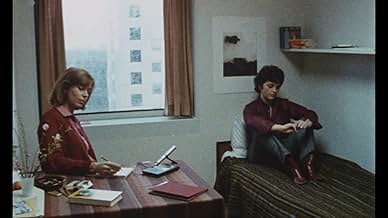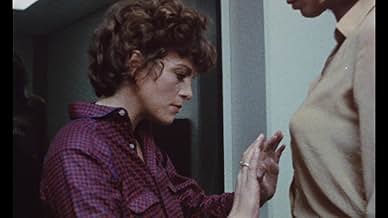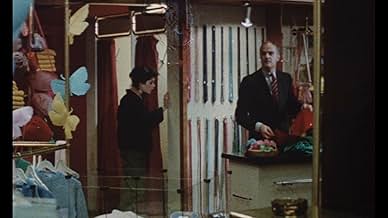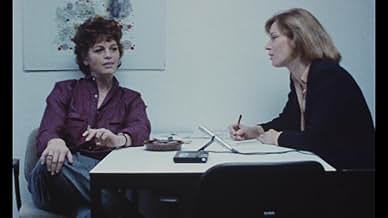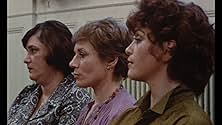IMDb-BEWERTUNG
6,7/10
1316
IHRE BEWERTUNG
Füge eine Handlung in deiner Sprache hinzuThree women of no previous acquaintance suddenly kill a male shopkeeper in the middle of the day. The female psychiatrist assigned to the case sets out to understand why.Three women of no previous acquaintance suddenly kill a male shopkeeper in the middle of the day. The female psychiatrist assigned to the case sets out to understand why.Three women of no previous acquaintance suddenly kill a male shopkeeper in the middle of the day. The female psychiatrist assigned to the case sets out to understand why.
- Auszeichnungen
- 3 Gewinne & 2 Nominierungen insgesamt
Eddie Brugman
- Echtgenoot
- (as Eddy Brugman)
Empfohlene Bewertungen
Very powerful and thoughtful. Much superior to Gorris' more-acclaimed Antonia's Line, in my opinion. This film has none of the cutesiness of Antonia but all of the thoughtfulness and thematic weight. The theme is a subtle examination of the roles of men and women in Dutch society, and I guess it could apply to many societies. The film has a viewpoint, but it problematizes and complicates matters so that it's impossible for the viewer to blindly accept that viewpoint. It examines SUBTLE discrimination and dehumanization.
The only frustration I had was the fact that the copy I viewed did not give subtitles to a lot of the dialogue--e.g., a woman listens to the radio for about a minute, but non-Dutch speakers (like myself) don't understand any of it, and I'm guessing that with a filmmaker as careful as Gorris, this dialogue is important.
The only frustration I had was the fact that the copy I viewed did not give subtitles to a lot of the dialogue--e.g., a woman listens to the radio for about a minute, but non-Dutch speakers (like myself) don't understand any of it, and I'm guessing that with a filmmaker as careful as Gorris, this dialogue is important.
Reminiscent of the play/short story/film, A Jury of her Peers, written by Susan Gaskel-a contemporary of Eugene O'Neill's who was way more popular than O'Neill at the time, much to O'Neill's dismay.
The misunderstanding of this controversial film often comes from the misconception that feminism hates men. The plot of three women killing a man in a boutique is indeed based on an actual event (although the victim in the news was a young woman). In this film, Marleen Gorris studies the extreme behaviour, relating it to the male-dominant legal system that does not give much room for studying people's feelings. If one can see that Gorris' position is more with the pyschiatrist who is sympathetic with the case rather than promoting hatred, it is not hard to see why Los Angeles Times considered the film as a subversive movie in the best sense of the word.
To call this movie hate literature is one thing, but the analogy used referencing Jews and Nazis is completely not applicable here. This is a film about power, domination, and oppression, all three of which men exercise over women in our society. One would have to live in a bubble to say that Jews hold the same position over non-Jews or Nazis (or did pre-WWII)! As a Jew, I find your comment mildly offensive, and as a man (while it is always difficult to recognize one's privilege), I find this film to be an amazing critique of patriarchy. While murder may not be the solution, this film shows the extraordinary way in which 3 women who have been beaten down their whole lives (and have nothing to lose) attempt to fight back against an enemy that is unbeatable. The laughter at the end of this film proves just who gets it and who doesn't. PS- I've heard that in some places during the initial screenings of this film, women in the theaters actually broke out in laughter with the women on screen during the court scene....
This film is NOT anti-male. It is not suggesting that women go out and randomly kill men just for being of that gender. What is does do is use a wonderful technique called reversal. If three men had brutalized a woman, well, "society" might not find that so shocking (maybe more now than earlier years, but certainly not as shocking as the reverse). It doesn't want to start propaganda, it wants to make you THINK. By making the therapist think on it, it forces the viewer to think on it as well. What's the history of women being brutalized and then remaining quiet about it? Have women really achieved the social, political, and economic equality that is the feminist goal? Why not? This movie doesn't hate men; it simply loves women enough to give everyone something to think about.
Wusstest du schon
- WissenswertesThe first plant that Nelly Frijda throws during her tantrum can be seen hitting the lens of the camera.
Top-Auswahl
Melde dich zum Bewerten an und greife auf die Watchlist für personalisierte Empfehlungen zu.
- How long is A Question of Silence?Powered by Alexa
Details
Box Office
- Budget
- 300.000 NLG (geschätzt)
Zu dieser Seite beitragen
Bearbeitung vorschlagen oder fehlenden Inhalt hinzufügen

